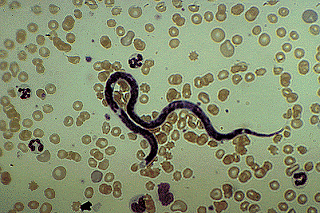Heartworm disease is caused by a parasite that lives mainly in the blood vessels of the lungs. Cats are not a natural host for heartworm, but tend to develop severe and potentially fatal disease even when only a single worm is present.
Heartworm disease has been seen in several species, but dogs are very susceptible. It can be fetal and is difficult to treat, but fortunately heartworm disease is easy to prevent.
Transmission of Feline Heartworm Disease
Feline heartworm is transmitted by an infected mosquito bite. Cats are susceptible to hearthworm disease even when kept indoors, as mosquitoes can fly find their way into the house. When the mosquito bites the cat to take its blood meal, it introduces the heartworm larva into the cats bloodstream. These larval heatworms invade the blood vessels in the lungs. These larval heartworms are capable of reproducing within 8 months of developing as adults. As they grow into adults they lodge themselves into the lungs and heart of the cat. Cats tend to have lower worm population then canines, as they have a stronger immune system. The damage by these parasites is still severe in cats and can cause death.
Risk Factors for Heart worm
Exposure to mosquitoes carrying microfilariae is the main risk for infection. Even indoor cats are at risk, because mosquitoes are notoriously difficult to keep out of the home.
Signs and Symptoms of Heartworm Disease in Cats
- Coughing
- Labored or rapid breathing
- Weight loss
- Vomiting
- Lethargy
- Rarely, other signs can be seen, such as fluid accumulation in the abdomen, fainting, and neurological signs such as in coordination and seizures.
- Sudden severe breathing problems, collapse, shock, and/or sudden death can occur in some cases
Microfilarial tests:This test can detect the microfilaria worms in blood by observing under microscope.
Antibody Test: This test is used to detect the antibodies made by the cat's immune system against the heartworm antigen. This test is not very reliable as it may test positive for a previous heartworm infection that has cleared up.
Antigen Test: This test helps in detecting presence of antigen in the blood. It may give false results as it detects the presence of only female heartworm. It may test negative results if the cat is infected by male or immature worms.
Echocardiogram and Radiography: Ultrasound may help detect presence of heartworms. Radiography helps detecting enlarged pulmonary arteries and enlarged right side of the heart and lung changes due to presence of heartworm.
Prevention of Feline Heart worm
It is always advisable to take your feline friend for regular veterinarian visits. Early diagnosis and treatment is always better than cure. You can always hope that the worm lives out it's lifespan within your cat without causing any major complications. A healthy cat is a 'purrrr..fect' pet.
Refer-
http://vetmedicine.about.com/od/diseasesandconditions/a/CW-Heartworm.htmhttp://www.buzzle.com/articles/heartworm-in-cats-feline-heartworm.html







Thanks for the share. It is pretty alarming that something like this could happen to your cat. My vet recommended me to start giving my cat some type of preventative medication such as heartgard. Thankfully I took his advice because my cat is healthy and happy.
ReplyDeleteThanks for sharing this informative content. Keep updating us.
ReplyDeleteIf someone is looking for the vet clinic in Singapore for the healthcare of their pet animals then they can Oasis Vet Clinic.
Oasis Vet Clinic is the best veterinary clinic in Singapore that provides the best healthcare services for the pet animals at the affordable prices.
Are you engaged in searching for the best clinic for pets? If you are engaged in such a search in reality, then you should be focused on lots of things. Oasis Vet is available with the best services and different types of benefits. Our professionals can easily treat any kind of issue related to animals.
ReplyDelete